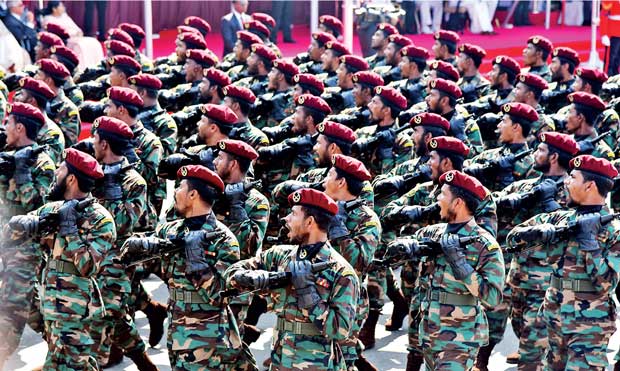Reply To:
Name - Reply Comment
Last Updated : 2024-04-24 11:56:00

Independence Day celebrations last Sunday: The freedom struggle continues
Freedom: What a great idea it is! As we celebrated this Sunday Sri Lanka’s 70th freedom day, it is relevant to ask how free we are and what freedom meant to us then and today.
Seventy years ago, when the Union Jack was brought down and the magnificent Lion flag was hoisted at Independence Square, the spirit of  freedom came alive in the country’s collective psyche. However, between then and now, the spirit of freedom was lost and we remain a bonded nation once again – bonded to ethnic politics, casteism, religious bigotry and, of course, greed that makes us selfish, corrupt and, some of our politicians, corrupt to the core.
freedom came alive in the country’s collective psyche. However, between then and now, the spirit of freedom was lost and we remain a bonded nation once again – bonded to ethnic politics, casteism, religious bigotry and, of course, greed that makes us selfish, corrupt and, some of our politicians, corrupt to the core.
Freedom is defined in a spiritual sense also and it is a matter for the ascetics and the spiritually enlightened to elucidate what freedom is about in a spiritual sense. Yet, a modicum of spiritual freedom could have done marvels for this country. It could have freed us from racist politics and spared us of the 30-year agony of a separatist war and many ethnic riots. If only we had defined freedom from a moralistic perspective also, we would not have fallen into the hell hole of corruption that has retarded our progress.
However, in this post-independence gloomy picture, a few bright spots also could be seen. Certainly, Sri Lanka’s activism during the early post-independence days in the global arena was such one bright spot reflective of its quest for international recognition as an independent state. We did work hard to make our presence felt in the international arena to show we were independent in the face of scorn heaped on us by the Soviet Union. In the core of the Soviet scorn was the fact that the Queen of England was still our sovereign and that we have signed a defence pact with Britain. It took some seven years for us to gain membership in the United Nations following a quid-pro-quo deal between the United States and the Soviet Union.
Perhaps the best display of our spirit of independence was seen in our commitment to Afro-Asian solidarity and our support for freedom struggles wherever they existed.
It could have freed us from racist politics and spared us of the 30-year agony of a separatist war and many ethnic riots
Sri Lanka, together with like-minded states such as India, Indonesia, Egypt, and also China, was part of a global movement that tried to set up a just international order. The newly independent nations were so united that they helped one another in achieving social and economic progress. They displayed determination and dedication, honesty and hard work, to create a world free of colonialism in all its forms. They were so firm in their resolve that they called for the redrafting of the UN Charter and international treaties, pointing out that they were not parties to these agreements when they were adopted.
At the deliberations for a new treaty on the Law of the Sea and talks at the United Nations Conference on Trade and Development (UNCTAD), the newly independent states had their say and sometimes, their way. For instance, when the Law of the Sea Convention was being deliberated, the United States held the view that any nation should be able to exploit the resources of the international seabed. Sensing that such a proposal would give an unfair advantage to technologically advanced nations, the newly independent nations proposed the setting up of the International Seabed Authority, which will be the custodian of the international seabed and its resources for the benefit of all nations. Sri Lanka led by Shirley Amerasinghe, one of its all-time best diplomats, played a pivotal role in the drafting of the Convention, which has been ratified by all maritime states with the solitary exception of the United States.
At UNCTAD talks, Sri Lanka led by its world renowned economist Gamani Corea, who went on to become the Secretary General of the UNCTAD, succeeded in establishing global mechanisms to ensure fair prices in the world market for the commodities of the newly independent states, though such safeguards were eventually to disappear in view of trade liberalization efforts in accordance with the provisions of the General Agreement on Trade and Tariff (GATT) first and later the World Trade Organisation.
But seventy years on, freedom from servility from an economic point of view still remains elusive
Moreover, little Sri Lanka played a peacemaker role in the conflict in Congo, the Suez war, the Soviet invasions of Hungary and Czechoslovakia and the Sino-India war.
All this was long before the spirit of our independence lost its sheen.
Coinciding with the hyper activism of the newly independent states, was the development of a body of economics theories that condemned the skewed world order which allowed developed nations – or the old colonial states -- to continuously exploit the new sates.
Significant among them was the dependence theory expounded by Andre Gunder Frank, a German intellectual who was ostracised by the capitalist world. His was a theory, which alerted the developing nations to the reality that they were still under the yoke of colonialism or neo-colonialism though they had gained independence.
In his book ‘The development of underdevelopment’, Frank rejected the idea that underdevelopment stems from an individual country’s isolation from the larger world and due to the influence of more traditional societies. On the contrary, he said underdevelopment resulted from the unequal distribution of resources and exploitation of the less developed and emerging countries by the more developed countries through the so-called “metropolis-satellite relations” theory or the core-periphery relations theory. At the global level, the periphery constitutes the exploited while the core represents the exploiter. He tried to change the system where the periphery at its own expense enriches the core.
Though Frank’s theory has been debunked by the ultra-liberals and conceited capitalists, who mistakenly think they have won the ideological battle with the socialists, it became a rallying cry for the developing nations to resist the exploitation of their resources by rich nations. Many independent nations from the 1950s to 1970s adopted economic protectionism and launched ambitious drives to make their countries self-sufficient in their bid to achieve economic freedom.
But seventy years on, freedom from servility from an economic point of view still remains elusive. We are more and more dependent on aid and loans from developed countries and international financial agencies. The increasing debt burden and the dependence on more debt to repay debts and undertake development work have made developing nations once again dependent nations. In most cases, what is at stake is a country’s sovereignty itself. Aid- or loan-dependent nations have little freedom to take independent decisions at the United Nations or other international forums.
For a few million dollars, the developing nations are compelled to sacrifice the spirit of independence with which they, from the 1950s to late 1970s, gelled themselves together in Afro-Asian camaraderie and later under the banner of non-alignment. These countries which were once under the yoke of colonialism have diluted their commitment to freedom struggles, especially with regard to the Palestinian crisis.
To be called ourselves independent, we need to achieve freedom from want and freedom from fear. We need to give a moral interpretation to freedom and independence to free ourselves from the clutches of corruption. Unfortunately, Sri Lanka has seen several false dawns: The last one being the end of war in 2009.

Add comment
Comments will be edited (grammar, spelling and slang) and authorized at the discretion of Daily Mirror online. The website also has the right not to publish selected comments.
Reply To:
Name - Reply Comment
US authorities are currently reviewing the manifest of every cargo aboard MV
On March 26, a couple arriving from Thailand was arrested with 88 live animal
According to villagers from Naula-Moragolla out of 105 families 80 can afford
Is the situation in Sri Lanka so grim that locals harbour hope that they coul